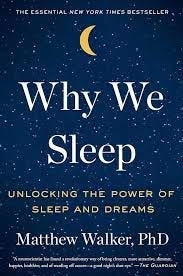4 simple ways to get better sleep - Dr. Matthew Walker (#32)
The renowned sleep expert's top tips to improve your sleep
Famously, Lebron James credits his career longevity to disciplined sleep (8-9 hours per night + a nap):
I just think that’s just the best way to recover. I could do all the training. I could do all the ice bags and…everything that we do that we have as far as our recovery package while I’m up. But when you get in that good sleep, you just wake up, and you feel fresh. You don’t need an alarm clock. You just feel like, “Okay. I can tackle this day at the highest level,” that you can get to.1
It’s not basketball’s G.O.A.T. that’s sleep-crazy, it’s the NFL’s as well. Tom Brady wrote: “My general discipline and pattern is to sleep from 9PM to 6AM. The greatest benefit of sleepis that it’s uninterrupted therapy and natural regeneration.”2
We all know sleep is important, but we probably still underrate it. Sleep can immediately impact you diet, productivity,3 workouts, and overall brain function after just a few days.
On diet, today’s Thinker, Dr. Walker, professor of neuroscience at the University of California, Berkley, writes:
Too little sleep swells concentrations of a hormone that makes you feel hungry while suppressing a companion hormone that otherwise signals food satisfaction. Despite being full, you still want to eat more. It’s a proven recipe for weight gain in sleep-deficient adults and children alike. Worse, should you attempt to diet but don’t get enough sleep while doing so, it is futile, since most of the weight you lose will come from lean body mass, not fat.
So how do we improve it?
In Dr. Walker’s book, Why We Sleep, he talks about, not just why sleep is so crucial for well-being, but how to get more of it. In today’s OGT, I list the few tips I found to be Walker’s most surprising or useful.
Let’s get it.
Four Tips For Better Sleep
(1) Stick to a sleep schedule.
It was a surprise to me that this was Dr. Walker’s #1 tip.
Go to bed and wake up at the same time each day. As creatures of habit, people have a hard time adjusting to changes in sleep patterns. Sleeping later on weekends won’t fully make up for a lack of sleep during the week and will make it harder to wake up early on Monday morning.
Set an alarm for bedtime. Often we set an alarm for when it’s time to wake up but fail to do so for when it’s time to go to sleep. If there is only one piece of advice you remember and take from these…tips, this should be it.
(2) Avoid caffeine and nicotine.
This one wasn’t a surprising fact: stimulants keeping you awake. It’s the how and why that impacted me:
Caffeine has an average half-life of five to seven hours. Let’s say that you have a cup of coffee after your evening dinner, around 7:30 p.m. This means that by 1:30 a.m., 50 percent of that caffeine may still be active and circulating throughout your brain tissue. In other words, by 1:30 a.m., you’re only halfway to completing the job of cleansing your brain of the caffeine you drank after dinner.
His advice: avoid caffeine in the afternoon.
(3) Take a hot bath before bed.
The drop in body temperature after getting out of the bath may help you feel sleepy, and the bath can help you relax and slow down so you’re more ready to sleep.
You may have had experience of that. But, again, it was the why:
You do not fall asleep faster because you are toasty and warm to the core. Instead, the hot bath invites blood to the surface of your skin, giving you that flushed appearance. When you get out of the bath, those dilated blood vessels on the surface quickly help radiate out inner heat, and your core body temperature plummets. Consequently, you fall asleep more quickly because your core is colder. Hot baths prior to bed can also induce 10 to 15 percent more deep NREM sleep in healthy adults.
(4) Dark bedroom, cool bedroom, gadget-free bedroom.
I include this oft-repeated IG trope for better sleep because of this fact: it’s a list of the easiest things you can change right now to sleep better tonight.
Get rid of anything in your bedroom that might distract you from sleep, such as noises, bright lights, an uncomfortable bed, or warm temperatures. You sleep better if the temperature in the room is kept on the cool side. A TV, cell phone, or computer in the bedroom can be a distraction and deprive you of needed sleep. Having a comfortable mattress and pillow can help promote a good night’s sleep. Individuals who have insomnia often watch the clock. Turn the clock’s face out of view so you don’t worry about the time while trying to fall asleep.
Compared to reading a printed book, reading on an iPad suppressed melatonin release by over 50 percent at night.
The OGT: How I’ve used these and what gadgets I use.
You should read this book. Everyone should.
In the 6 years since I’ve read it, it completely changed how I think about, and go about, sleep(ing). It happened like this: (1) Walker’s message got through to me, (2) it changed my beliefs about sleep, (3) as a result, it changed the priority to which I ascribe sleep.
Haruki Murakami quit smoking like that. “I couldn’t very well keep on smoking and continue running,” he wrote. He believed running led to better writing. “I placed the highest priority on the sort of life that lets me focus on writing.”
At the very least, watch Walker’s MasterClass. The payback it gives you will easily account for the $200/year.
But if you don’t have the time for either—hopefully because you’re sleeping so much— here’s how I implemented the above:
Sleep Schedule. If you’re trying to maintain a schedule, there’s no trick. You just have to prioritize sleep in the face of public ridicule. However, if you’re trying to shift that schedule earlier, I found that it’s hard to start with the bedtime. Instead, plan a two-week stint where you can commit to waking up earlier. You’ll be tired and pissed off in the short run, but in the long-run, you’ll start wanting to (needing to) pass out earlier.
Avoid Caffeine in the afternoon. A good first step is switching from coffee to tea or decaf coffee in the afternoon (FYI- decaf is not 100% caffeine free). If you go tea, green tea has half the caffeine of black. If you go decaf, I really like these Four Barrel Instant Decaf packets.
Take a hot bath in the early evening. I find this easy to prioritize because (a) it’s relaxing, (b) the potential cardiovascular benefits, and (c) I still get work done using this bathtub caddy. (Yes, I’m serious).
Dark, cool, ambient bedroom.
Sleep masks. I was always against these for obvious reasons: they look and feel dumb. Also, I found them uncomfortable. So I—no joke— used the sleeve of a long-sleeve shirt to cover my eyes for years until my buddy Geremy, a long-time adherent and sleep enthusiast, got me to cave. A few weeks later, Tim Ferriss (a two-time OGTer), recommended this one, which I bought and love.
Cool. We sleep best in the mid-60s temperatures. Keep your room cold.
Portable Noise Machine. I used to use a phone on my app until I came across this portable noise machine by Hatch (recommended by Kevin Kelly’s substack, Recommendo). It’s great.
This was on the Tim Ferriss Show. Tim who has been featured in not one but two OGTs, interviews a lot of great thinkers and, if you’re not familiar, it’s a great resource.
From Brady’s, The TB12 Method. A book that is 50% sales pitch (to buy, for example, Brady’s “functional apparel and sleepwear), and 50% Brady’s core philosophy on health. I actually spent a week at the TB12 Therapy Center in Foxboro, and wrote about the experience and about the book here.
“Ten days of six hours of sleep a night was all it took to become as impaired in performance as going without sleep for twenty-four hours straight.” - Dr. Walker





